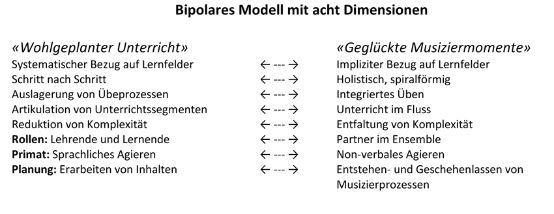Making music at the center of group lessons
On March 13 and 14, Peter Röbke, Elisabeth Aigner-Monarth, Natalia Ardila-Mantilla and other experts discussed the topic "Music-making at the heart of instrumental group lessons?"

The lively and stimulating symposium with speakers and participants almost exclusively from Austria and Germany - only two music academy teachers from Switzerland! - was dedicated to the conference topic in a variety of ways. The question mark in the title was more than just a trademark, as it was at the last such event in 2009, "Learning to make music - even outside of lessons?".
In fact, it was hard to avoid asking a wide variety of questions even before the symposium: If music-making is not at the heart of instrumental teaching, what else is? And why only in group lessons? Is the well-known motto of Keith Swanwick - Teach Music Musically - does not apply to all types of music education? And if this core principle seems to be a matter of course, why is heartfelt music-making still a problem in the classroom? What remains underexposed in group lessons? How and when do musical learning processes unfold? How can pedagogical goals such as musical expression, artistic development and creativity be addressed in beginner lessons? Where can deficits be identified in instrumental teacher training?
Right at the beginning, Ulrike Kranefeld used short, concise video sequences and meaningful statistics from her JeKi research project to show how little use is made of collaborative music-making time in so-called group lessons. It is impressive how young pupils in sequential individual lessons - apparently a widespread form of misunderstood group work - demonstratively go to sleep as soon as the teacher turns their attention to a classmate. Wouldn't there be potential for development here in alternating between plenary sessions and individual support involving all pupils? On the other hand, it was remarkable how the children were able to devote themselves to the musical events in a successful lesson with a JeKi cello group.
Being immersed from the start
This is where the director of the institute and "host" of the event, Peter Röbke, picked up when he argued that there are limits to purposeful didactic action. For him, musical moments are ultimately not available, i.e. they cannot be completely planned rationally. He argued that music lessons should not be conceived as a didactic and methodical production process, but as a moment of surrender and the ability to get involved in spontaneous events; a "tightrope walk between the usual course and that completely different experience". According to Röbke, being immersed, moments of happiness, breaking through emotions, crossing boundaries and other almost spiritual experiences are possible in a special way in group lessons, right from the start. "We should focus on this pedagogically (less didactically ...)!" "Pay attention to fulfilling moments and give them space in the classroom!"
Making music is also a priority for Elisabeth Aigner-Monarth and Natalia Ardila-Mantilla. The two young piano teachers and employees of the institute concretized Röbke's concerns in a bipolar model with eight dimensions (see table). On the left-hand side are the characters of well-planned lessons, on the right-hand side the essences of successful music-making moments.
According to the two researchers, teaching means sitting down at the mixing desk with the pupils and constantly readjusting the levers of these different dimensions.
The absence of Ulrich Mahlert, whose contribution could only be presented as a substitute, was regrettable. It dealt with the manifestations and conditions of happiness experiences in music-making. It would have been exciting to be able to discuss the significance of this topic and its relation to group lessons with the author himself.
Wolfgang Lessing spoke about the tension between (music) pedagogical antinomies in instrumental group lessons: for example, the incompatibility of planning and spontaneity, differences in experience and partnership, organization and individualization. It is not possible to go into the individual antagonisms in this short report. However, the idea of using antinomies as opportunities should be mentioned. Especially in group lessons and in the experience of making music together, it is important, according to Lessing, not to see apparent incompatibilities as boundaries, but as thresholds that invite us to cross them.
Cultivating the joy of music-making and expression in instrumental lessons from the very beginning with heart and soul, experiencing the whole of life in every note - Wolfgang Rüdiger embodied this concern with his bassoon, involving the audience: "If you celebrate it, it's art. If not, it isn't."









